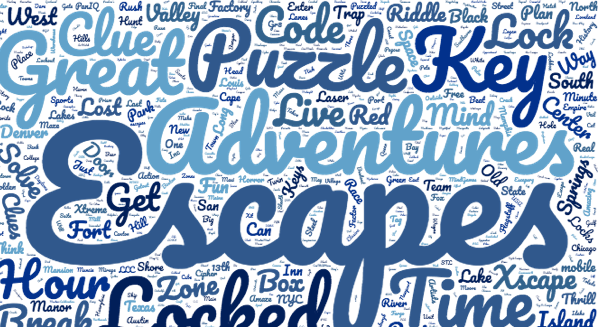
The first step to establishing an escape room business is to craft your business plan. A well thought out business plan will help you answer important questions about your target market, financing, and your company vision. All of these questions will impact how you will structure your business and brand. Read our step-by-step guide on how to write an escape room business plan for more.
Once you have outlined your business plan you will be ready to take the first step of establishing your business: choosing a name
1. Choose Your Company Name
Coming up the right name for your escape room business requires a unique blend of creativity and business practicality (a challenge you will face again and again during your time as an escape room owner).
Aside from the obvious, your business name has one important function: to connect with your customers. It is one of the first things customers will associate with when they hear about your business… and first impressions are everything.

Choosing a great name is no easy task. It needs to be unique, but simple. Brief, but descriptive. Common, but memorable. On top of that, you need to navigate trademarks and domain name availability.
Check out chapter 3 of The Escape Room Startup Guide for 10 things to consider when naming your escape room business.
Once you have selected a business name you should act quickly to secure and protect the brand you are building. We recommend securing your domain name as early as possible along with your future social pages (Facebook, Instagram, Twitter, LinkedIn, etc). You may also consider applying for a trademark for your name and company logo.
Pro Tip: To avoid the spectre of online lookalikes, consider buying variations of your domain name as well. For example, if you claimed the domain escapekingslanding.com, consider securing variations like kingslandingescape.com to prevent competitors from taking a similar name. You may also want to secure other top-level domains like .net and .org.
2. Establish a Business Entity
When registering an escape room business it is important to decide what kind of business entity you will create. Do you register your business as a Corporation, an LLC, or something else?
The short answer is…It depends.
It’s best to consult with an attorney and an accountant to discuss which type of entity best suits your needs, and understand the implications of each option.
Bear in mind that the business structure you choose has implications on three key aspects of your business: legal structure, taxes, and liability.
- Legal – Different levels of legal protection, limitations on the number of co-owners and investors, and other requirements vary between business entities
- Taxes – Each business entity has a different tax structure that affects when, how, and how much you pay.
- Liability – Your business structure also determines your legal and financial liability, including your ability to separate personal and business assets.
3. Define Your Brand
Branding is one of the most important aspects of any business, large or small. An effective brand strategy gives you a major edge in an increasingly competitive market. But what exactly does “branding” mean? How does it affect your business success?
Simply put, your brand is the promise you make to your customers. It tells them what they can expect from your games, and it differentiates your offering from the others around you. Your brand is a product of who you are, who you want to be, and how people perceive you.
There are four foundational elements to your brand: values, personality, voice, and visual identity. These elements will impact everything from how you operate your business to how you build your website and design your marketing materials.
- Core values: Your core values answer the question: why does your escape room exist? They have little to do with making money, and everything to do with your business’ purpose. Your core value impact everything from how you run your business to your brand communicates, interacts, and displays itself to customers and staff.
- Brand personality: Your brand’s personality describes the set of human characteristics that describe your brand. Escape room brands that have a well-defined personality make themselves relatable on a personal level. Their customers connect emotionally with their brand, which improves everything from bookings to reviews to customer loyalty.
- Visual Identity: Your brand visual identity is the consistent visual representation of your brand, including your logo, color scheme, fonts, typography, graphical elements, etc. A great brand visual identity is distinct enough to stand out, and used consistently enough that it makes your brand easily recognizable.
Conclusion
The three main things to consider when establishing your escape room business are you name, your business entity, and your brand.
First, you need to choose a name that is both informative and memorable, which is unique, not trademarked, and has an available website domain. You may also want to protect your business name by trademarking it and acquiring your domain (including variations of the name and top level domain).
Next, you need to consult with your lawyer and accountant to pick the right business structure for you based on the varying legal structures, applicable taxes, and liability.
Finally, you will want to establish your brand, including your core values, personality, voice, and visual identity.
For more information check out our resources below:




